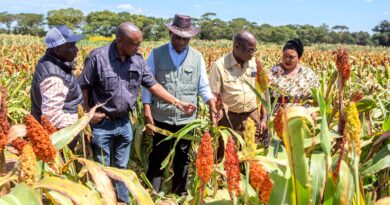Lufwanyama Unites to Empower Women as Leaders in Climate Action and Environmental Justice
Government, traditional leaders, and civil society have joined forces to launch the Resilient Women for Climate Action and Environmental Justice project in Lufwanyama District, Copperbelt Province, aimed at strengthening women’s leadership in environmental governance and climate resilience.
Officiating at the launch, Lufwanyama District Commissioner, Justin Mwalikwa, commended the Centre for Environment Justice (CEJ), Future Preneurs Zambia, Care for Nature, and cooperating partner The Carter Foundation for selecting Lufwanyama as a focal area for the initiative. He said the project reflects Zambia’s strategic vision for inclusive, climate-resilient, and community-driven development.
Mr Mwalikwa stressed that women and traditional leaders are among those most affected by environmental degradation and climate change but have historically been underrepresented in decision-making processes. He acknowledged women’s crucial roles in food production, household management, and resource stewardship, calling the project “a call to action” to amplify their voices and strengthen their participation.
Highlighting challenges faced by the district, the DC pointed to drought, deforestation, pollution, and the expansion of extractive activities—issues that disproportionately affect women and vulnerable groups. He reaffirmed government’s commitment, under President Hakainde Hichilema, to addressing climate change, advancing gender equality, and promoting sustainable development through strong national policies and frameworks.
He pledged the full support of the district administration and urged all government departments and partners to work together to empower women environmental rights defenders and support community-led sustainability initiatives.
CEJ Executive Director, Maggie Mapalo Mwape, said the project was both symbolic and practical in advancing environmental justice, climate resilience, and women’s empowerment. She expressed gratitude to cooperating partners, particularly The Carter Foundation, and recognised the role of local government leaders, traditional authorities, civil society, and women environmental defenders in ensuring success.
Ms Mwape outlined CEJ’s mission to promote environmental sustainability and active community participation in environmental governance. She pointed out Lufwanyama’s rich natural resources alongside pressing environmental challenges, including water and air pollution, deforestation, biodiversity loss, and the worsening effects of climate change.
She emphasised that the project would strengthen women’s leadership, advocacy skills, and collaborative networks with local institutions and civil society, helping shift communities from passive recipients to active shapers of environmental policy.
Representing Chief Lumpuma of the Lamba people, Mr Chomba voiced strong support for the project, describing the land of Lufwanyama as “more than just soil – it is history, livelihood, and identity.” He praised the initiative for empowering women environmental defenders while working hand-in-hand with traditional leaders. He stressed that lasting change in rural areas is achieved through partnership, respect for culture, and empowering those closest to the land.
Calling the launch a “day of unity” for government officials, traditional leaders, civil society, and local communities, Mr Chomba pledged the full backing of traditional leadership and urged cooperation built on transparency and shared purpose.
Environmental Defenders Coordinator, Dalitso Mvula, announced that the project will target five specific areas in Lufwanyama—Mukumbo, Kapata, Kankonde, Komune, and Chifumba—empowering women environmental defenders to lead climate action efforts. She described how environmental degradation and water scarcity have placed heavier burdens on women, who often travel long distances to access water.
Ms Mvula said the initiative aims to address women’s underrepresentation in environmental governance by building leadership and advocacy skills, while fostering partnerships between women, district institutions, and civil society. She also highlighted plans to create dialogue and partnership forums, as well as signing memoranda of understanding to formalise cooperation and improve coordination.
Lufwanyama Town Council Secretary, Lynda Mapara, noted that the project aligns closely with government empowerment programmes, complementing ongoing national development objectives.
The launch brought together representatives from government departments, traditional leadership, civil society, and local communities, marking the start of a concerted effort to build a more sustainable, equitable, and climate-resilient future for Lufwanyama and beyond.



